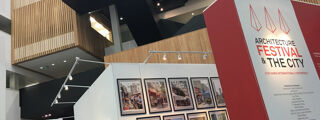This conference at Birmingham City University looked at how festivals, rituals and carnivals transform cities. The curated exhibition formed a celebration, exploring festivals as a fundamental part of humanity and the cities in which we live. The international conference included 120 delegates from all around the world. It was held in collaboration with Architecture Humanities Research Association.
Architecture, Festival and the City responded to city festivals in their many forms. As people gather and celebrate, the streets are filled with colour, noise and activity and fantastical events occur in everyday places. Evolving from myths, beliefs and religions, festivals create a space for individuals to meet and celebrate shared values.
The lead academics worked together to organise the conference. Monthly meetings were conducted to coordinate different activities involved in the conference organisations to ensure the conference is a bespoke experience for all the delegates that speak about the accents of festivals. The conference was also designed as an extra curriculum learning activity for the students to give them a flavour of academic conferences and up-to-date debates/theories in the field.
With the contribution from the lead academics and their networks to conduct the double blinded peer reviews of the conference papers, two academic outputs have been produced collectively - Architecture and Culture Special Issue, and the Architecture, Festival and City book published by Routledge. In particular, Dr. Maria Sanchez, Dr. Jieling Xiao and Prof. Christian Frost have led the editing of the journal special issue whilst Dr. Jemma Browne and Prof. Christian Frost have led the editing of the book.
The knowledge shared at the conference was disseminated to a wider audience through an edited book published by Routledge and an edited journal special issue from the Journal of Architecture and Culture. The journal special edition was aimed at an academic readership, whereas the edited book is targeted towards a more mainstream audience.
The book explores how festivals can provide a lens through which to examine the relationship between the city and the citizen, deciding whether this is fixed through time, or transforms in response to changes in the modern urban conditions. The purpose is to demonstrate how the urban space is used to represent ideas of belonging and identity. Parallels are drawn between the relationship of contemporary social and political gatherings with traditional ritual practices.
Readers are challenged to consider the relationship between city spaces and festivals in a new way, emphasising the complex multi-layered aspects of the interaction and how they can mutate over time.
The two edited volumes have contributed to the current debates and theories on cities and festivals. Generated from the conference, there is a wide reach to audience from the international academic community. This conference has led to the success of getting the permission to host the coming 9th European Research in Architecture and Urbanism (EURARU) Congress and Symposium.
Outputs on the BCU open access research repository and/or other sources
